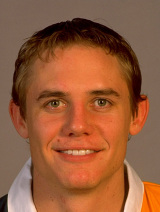
|
Full name Stephen James Larkham
Born
May 29, 1974, Canberra, ACT
Current age 49 years 332 days
Major teams Barbarians, Brumbies, Australia
Position Fullback, Fly-half
Height
6 ft 3 in
Weight 194 lb
|
| Span | Mat | Start | Sub | Pts | Tries | Conv | Pens | Drop | Won | Lost | Draw | % | |
|---|---|---|---|---|---|---|---|---|---|---|---|---|---|
| All Tests | 1996-2007 | 102 | 97 | 5 | 135 | 25 | 2 | 0 | 2 | 68 | 31 | 3 | 68.13 |
| Bledisloe Cup | 1997-2007 | 21 | 20 | 1 | 15 | 3 | 0 | 0 | 0 | 9 | 12 | 0 | 42.85 |
| IRB Rugby World Cup | 1999-2007 | 12 | 12 | 0 | 18 | 3 | 0 | 0 | 1 | 11 | 1 | 0 | 91.66 |
| The Rugby Championship | 1997-2007 | 38 | 36 | 2 | 33 | 6 | 0 | 0 | 1 | 17 | 20 | 1 | 46.05 |
| Test debut | Australia v Wales at Sydney, Jun 22, 1996 match details |
| Last Test | Australia v Japan at Lyon, Sep 8, 2007 match details |
| Test Statsguru | Main menu | Career summary | Match list | Most points | Most tries | Tournament list |
Stephen Larkham came to embody the success of the Australian team from the late 1990s, right up to his retirement from international rugby following the 2007 World Cup.
His partnership with George Gregan, the scrum-half, became one of the most reliable and recognisable in world rugby, with Gregan's pace and grit complemented by the rangy, assured Larkham. He first emerged in the Wallaby setup in 1997 as a full-back, having played the inaugural Super 12 as the ACT Brumbies' utility back.
His early Tests were notable for try-scoring performances against South Africa and New Zealand during the 1997 Tri Nations, but it was not until his switch to the No. 10 jersey that his international career came to life. Early concerns over his lack of kicking ability were assuaged by his ability to knit the Australian back line together. Larkham's twin trademarks of the ghosting break and long pass allowed him to manage the backline and unleash it into space.
This was perhaps best illustrated during the 2000 Bledisloe Cup match, in which the Wallabies were reeling following three All Blacks tries in seven minutes. Larkham held his nerve as those around him stood shell-shocked and danced through the smallest of misalignments in the New Zealand defence before floating a long pass into the waiting hands of Stirling Mortlock, who streaked away to score.
While Australia lost the game to a last minute Jonah Lomu try, Larkham's invaluable calming presence and expert eye for a gap was there for all to see.
Like so many before him, Larkham's switch proved to be a gamble that would come to characterise the style and success of his side for a decade. His loping stride and deceptive darting pace allowed him an almost imperceptibly large amount of time on the ball. As so many international teams found out, allowing Larkham time and space was something that could have immediate and costly consequences.
Larkham was selected for three Australian World Cup squads, and was an integral part of the 1999 World Cup winning side. It could be argued that Larkham's drop goal that beat defending champions South Africa in extra time of the semi-final was the defining moment of their effort.
Standing on an injured knee, Larkham struck through the ball and landed a monster 48m drop that belied his status as a non-kicking outside-half. Larkham and Gregan carried their success at international level into the domestic arena, winning the Super 12 in 2001 and 2004 with the Brumbies.
His influence in the side continued through to the 2003 World Cup, and Larkham was again an important part of the team that was beaten in the final by England. His retirement in 2007 turned out to be a sad end to a great career, as both he and his partner Gregan bade farewell following their World Cup quarter-final defeat to England. Larkham had been plagued by injury in the build up to the tournament, and was unable to play in what would have turned out to be his final Test.
Following the retirement of Larkham and Gregan from international rugby, a stand was named after them at Canberra Stadium, home of the Brumbies. Their impact on the club game was similar to that on the international stage, and their Brumbies remain the only Australian Super 12 and 14 champions.
Larkham's career stalled following his retirement from international and Super 14 rugby, with a move to Edinburgh Rugby falling through in 2007. In 2008 Larkham announced that he would be joining the Ricoh Black Rams in Japan, and made his return to the pitch with two appearances for the Barbarians against Ireland and England later that summer.
In 2010, he confirmed that he would return to the Brumbies ahead of the 2011 Super 15 season to take up the role of attack coach.
Live Sports
Communication error please reload the page.
-
Football
-
Cricket
-
Rugby
-
- Days
- Hrs
- Mins
- Secs
F1 - Abu Dhabi GP
Abu Dhabi Grand Prix December 11-131. Max Verstappen ()
2. Valtteri Bottas (Mercedes)
3. Lewis Hamilton (Mercedes)
4. Alexander Albon ()
5. Lando Norris ()
6. Carlos Sainz Jr ()
-
ESPNOtherLive >>
Darts - Premier League
Golf - Houston Open
Snooker - China Open
Tennis - Miami Open
